
SOCIOBIOLOGY
Scope & Guideline
Innovating Research in Agricultural Entomology
Introduction
Aims and Scopes
- Social Insect Behavior:
Research on the social structures, behaviors, and interactions within insect communities, particularly focusing on ants, bees, and wasps. - Ecological Interactions:
Studies that explore the complex interactions between social insects and their environment, including pollination, mutualisms, and competition. - Taxonomy and Systematics:
Investigations into the classification, description, and distribution of social insects, contributing to our understanding of biodiversity. - Genetic and Molecular Studies:
Research utilizing genetic and molecular techniques to understand the evolutionary relationships and genetic diversity within and between species. - Environmental Impact Studies:
Examinations of how environmental changes, such as habitat destruction and climate change, affect social insect populations and their interactions.
Trending and Emerging
- Impact of Climate Change:
Growing research on how climate change affects the behavior and distribution of social insects, emphasizing the need for studies addressing ecological resilience. - Ecosystem Services and Conservation:
An increasing focus on the role of social insects in ecosystems, particularly their contributions to pollination and soil health, and how these can be conserved. - Molecular Ecology and Genomics:
The application of molecular techniques to study genetic diversity and evolutionary relationships, reflecting a trend towards integrating molecular biology with ecology. - Human-Insect Interactions:
Research exploring how social insects interact with human activities, including agriculture and urbanization, highlighting the socio-economic implications of these interactions. - Network Analysis in Ecological Studies:
The use of network analysis to understand complex interactions among species, particularly in mutualistic relationships involving social insects.
Declining or Waning
- Traditional Pollinator Studies:
While pollination remains a critical area, traditional studies focusing solely on bees without considering broader ecological interactions have become less prominent. - Invasive Species Assessments:
Research specifically centered on invasive social insects has seen a decline, as the focus shifts toward understanding their ecological impacts in a more integrated manner. - Basic Behavioral Observations:
Studies that provide basic descriptions of insect behaviors without an ecological or evolutionary framework are becoming less frequent, with a greater emphasis on integrative approaches.
Similar Journals
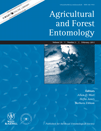
AGRICULTURAL AND FOREST ENTOMOLOGY
Advancing knowledge at the intersection of agriculture and entomology.AGRICULTURAL AND FOREST ENTOMOLOGY is a leading journal published by Wiley, focusing on the interface of entomology, agriculture, and forestry. With a robust impact reflected in its Q2 and Q1 quartile rankings in prominent categories like Agronomy and Crop Science, Forestry, and Insect Science, this journal serves as a vital platform for researchers and professionals seeking to advance their understanding of insect impacts on agricultural and forest ecosystems. Since its inception in 1999, it has provided a comprehensive collection of high-quality research, facilitating interdisciplinary discussions and innovations in pest management, biodiversity, and sustainable practices. Although it does not currently offer Open Access, the journal continues to uphold rigorous peer-review standards, ensuring that published works maintain a profound scientific value. As of 2023, its Scopus rankings further signify its prominence in the field, engaging a global audience keen on addressing the pressing challenges faced within agricultural and forest sciences.

ENVIRONMENTAL ENTOMOLOGY
Connecting Insect Biology with Environmental DynamicsENVIRONMENTAL ENTOMOLOGY, published by Oxford University Press, is a premier academic journal dedicated to advancing the field of entomology through the lens of environmental science. With the ISSN 0046-225X and E-ISSN 1938-2936, this journal has been a pivotal platform since its inception in 1973, currently converging until 2024. Recognized within the Q2 and Q1 category quartiles, it holds a prominent position, ranking 41st in Insect Science and 225th in Ecology, Evolution, Behavior and Systematics, showcasing its impact and relevance in the scientific community. The journal encompasses a broad scope, covering critical topics related to the interplay of insects and their environments, making it an essential resource for researchers, professionals, and students interested in ecological dynamics and insect biology. Although it does not provide open access, the research published here is vital for those striving to enhance their understanding of ecological systems and the vital roles insects play therein.
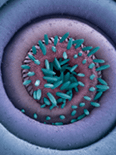
Annual Review of Entomology
Pioneering Insights in Ecology and EvolutionAnnual Review of Entomology, published by Annual Reviews, is a premier journal dedicated to advancing the understanding of entomology through comprehensive review articles from leaders in the field. With a focus on Ecology, Evolution, Behavior, and Systematics and Insect Science, the journal ranks in the top quartile (Q1) as of 2023, reflecting its significant impact and relevance in these disciplines. Based in the United States, the Annual Review of Entomology has been a trusted resource since its inception, providing critical insights that inform research, policy, and education in entomology. Researchers and professionals will find valuable reviews that synthesize current knowledge and highlight future directions in insect research. The journal's impressive standing, as indicated by its rankings—first in both Agricultural and Biological Sciences categories—emphasizes its pivotal role in shaping scientific discourse and innovation.
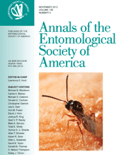
ANNALS OF THE ENTOMOLOGICAL SOCIETY OF AMERICA
Unveiling Nature's Secrets Through EntomologyANNALS OF THE ENTOMOLOGICAL SOCIETY OF AMERICA is a premier journal dedicated to advancing the field of insect science, published by Oxford University Press. With an impressive impact factor and classified in the Q1 quartile for its category, this journal ranks among the top publications in agricultural and biological sciences, specifically within insect science, positioned at #28 out of 181, indicating its significant influence and high-quality research contributions. The journal aims to disseminate original research, comprehensive reviews, and groundbreaking findings that enhance our understanding of entomology, spanning across ecological, evolutionary, and applied segments. With a consistent publication history since 1938, researchers, professionals, and students will benefit from the wealth of knowledge presented in its pages. Although the journal does not currently offer open access, it remains a vital resource for those seeking to stay at the forefront of entomological research and innovation.
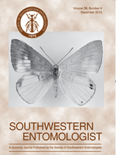
SOUTHWESTERN ENTOMOLOGIST
Exploring the Intersection of Insect Science and AgronomySOUTHWESTERN ENTOMOLOGIST is a pivotal academic journal dedicated to advancing the fields of Agronomy, Ecology, and Insect Science. Published by the SOUTHWESTERN ENTOMOLOGICAL SOC in the United States, this journal plays a crucial role in disseminating vital research findings that address pressing ecological and agricultural challenges. With its ISSN 0147-1724 and E-ISSN 2162-2647, the journal has been publishing comprehensive studies since 1993 and continues to contribute significantly to the knowledge base up to 2024. As a Q4 ranked journal in both Agronomy and Crop Science and Ecology, as well as Insect Science, it provides an inclusive platform for researchers and students to share their insights and foster collaborations. Although it currently does not offer open access options, the content is accessible to academic institutions and professionals, ensuring that significant findings reach a broad audience. Given its niche focus, SOUTHWESTERN ENTOMOLOGIST not only appeals to researchers and students but also to professionals looking to stay updated on the latest trends and developments in entomology and its related fields.
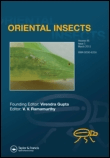
ORIENTAL INSECTS
Fostering Innovation in Entomological ResearchORIENTAL INSECTS is a distinguished journal dedicated to advancing the field of Insect Science, published by the reputable Taylor & Francis Ltd. With its long-standing history since 1967, this journal provides a platform for innovative research focused specifically on the diverse insect fauna of the Oriental region, encompassing topics such as taxonomy, ecology, physiology, and behavior. The journal is indexed with an ISSN of 0030-5316 and an E-ISSN of 2157-8745, making it easily accessible to a global audience. Although it currently does not operate under an Open Access model, its rigorous peer-review process ensures the dissemination of high-quality research. As a Q4 journal in the Insect Science category for 2023 and ranked 103 out of 181 in Scopus, ORIENTAL INSECTS remains a vital resource for researchers, professionals, and students seeking to enhance their understanding of insect biodiversity and conservation. Located in the United Kingdom, it is committed to promoting the latest scientific findings and fostering collaboration among entomologists worldwide, contributing significantly to the academic community.
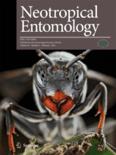
NEOTROPICAL ENTOMOLOGY
Connecting Researchers to the Richness of Neotropical EntomologyNEOTROPICAL ENTOMOLOGY, published by the Entomological Society of Brazil, is a leading journal in the field of Insect Science, recognized for its significant contributions to the understanding of entomological research within the Neotropical region. With an impact factor placing it in the Q2 category and ranked #52 out of 181 in the Scopus rankings for Agricultural and Biological Sciences, this journal provides a vital platform for both seasoned researchers and emerging scholars to publish their innovative findings. Covering a broad scope of topics related to entomology, NEOTROPICAL ENTOMOLOGY aims to highlight the unique biodiversity and ecological significance of insects, fostering further appreciation and study within this crucial area of life sciences. The journal is available in both print (ISSN: 1519-566X) and online (E-ISSN: 1678-8052), ensuring accessibility to a wide audience and enhancing the dissemination of knowledge. As it converges towards its 2024 volume, the journal remains committed to advancing the scientific understanding of insect life in the tropics, making it an essential resource for researchers, professionals, and students alike.
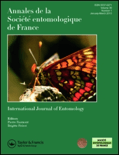
ANNALES DE LA SOCIETE ENTOMOLOGIQUE DE FRANCE
Bridging knowledge gaps in insect biology.ANNALES DE LA SOCIETE ENTOMOLOGIQUE DE FRANCE, published by Taylor & Francis Ltd, is a prestigious journal that focuses on the dynamic field of entomology, offering a platform for the dissemination of innovative research related to insect science and ecological systems. With an increasing impact factor and notable quartile rankings (Q2 in both Ecology, Evolution, Behavior and Systematics, and Insect Science), the journal serves as a vital resource for researchers, professionals, and students alike, stimulating advances in our understanding of insect biology and its implications for broader ecological contexts. Although it is not an Open Access journal, it boasts a strong reputation within the academic community, as evidenced by its significant Scopus rankings and a commitment to high-quality peer-reviewed content. With its extensive historical archive since 1988 and a continuous publication schedule through 2024, ANNALES DE LA SOCIETE ENTOMOLOGIQUE DE FRANCE remains an essential reference for those engaged in the study of entomology and related ecological fields. For more information, visit the publisher's site at Taylor & Francis Ltd.
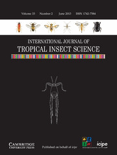
INTERNATIONAL JOURNAL OF TROPICAL INSECT SCIENCE
Exploring the Ecological Impact of Insect DiversityINTERNATIONAL JOURNAL OF TROPICAL INSECT SCIENCE, published by Springer International Publishing AG, is a leading interdisciplinary journal dedicated to advancing knowledge in the fields of insect science and ecology. With its ISSN 1742-7584 and E-ISSN 1742-7592, this journal provides a platform for researchers to publish high-quality, peer-reviewed articles that explore various aspects of tropical insect biology, behavior, and their ecological impacts. As evidenced by its Q3 ranking in both Ecology, Evolution, Behavior and Systematics and Insect Science, it plays a vital role in fostering scientific dialogue and innovation within these disciplines. Researchers affiliated with the journal benefit from its visibility and growing impact, as demonstrated by its Scopus ranks, with a percentile standing of 61st in Insect Science. Although the journal is not open access, it still reaches a wide academic audience, making significant contributions to our understanding of tropical ecosystems. Situated in Switzerland, this journal is crucial for students, professionals, and researchers invested in the intersection of entomology and ecological science.

Austral Entomology
Connecting Basic Research with Practical SolutionsAustral Entomology, published by Wiley, is a leading journal in the field of entomology, specializing in the study of insects within the wider context of agronomy, ecology, and evolutionary biology. With an impact factor that reflects its growing influence and a commendable H-Index, this journal serves a vital role in disseminating cutting-edge research that bridges the gap between basic entomological studies and applied agricultural practices. Since its inception in 2014, Austral Entomology has maintained a strong commitment to open access, fostering a collaborative environment for researchers and practitioners. Recognized within category quartiles Q2 across multiple fields such as Agronomy and Crop Science and Ecology, it ranks impressively among journals in Insect Science, showcasing the significance of its contributions to understanding insect behavior, ecology, and systematics. Given its robust accessibility options, the journal not only enhances the visibility of entomological research but also empowers professionals and students alike to engage with and apply findings in real-world contexts.